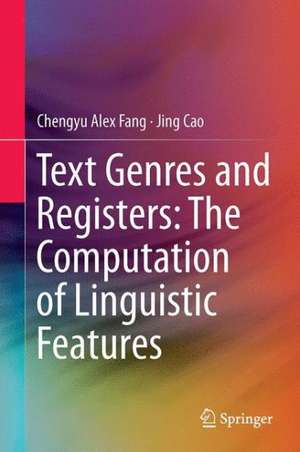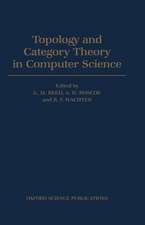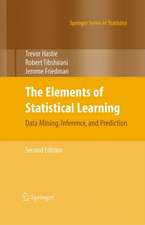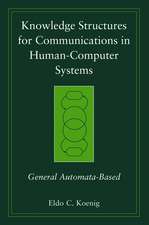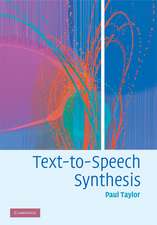Text Genres and Registers: The Computation of Linguistic Features
Autor Chengyu Alex Fang, Jing Caoen Limba Engleză Hardback – 16 mar 2015
Preț: 394.87 lei
Nou
Puncte Express: 592
Preț estimativ în valută:
75.56€ • 79.10$ • 62.52£
75.56€ • 79.10$ • 62.52£
Carte tipărită la comandă
Livrare economică 05-19 aprilie
Preluare comenzi: 021 569.72.76
Specificații
ISBN-13: 9783662450994
ISBN-10: 3662450992
Pagini: 294
Ilustrații: XIII, 267 p. 40 illus.
Dimensiuni: 155 x 235 x 18 mm
Greutate: 0.58 kg
Ediția:2015
Editura: Springer Berlin, Heidelberg
Colecția Springer
Locul publicării:Berlin, Heidelberg, Germany
ISBN-10: 3662450992
Pagini: 294
Ilustrații: XIII, 267 p. 40 illus.
Dimensiuni: 155 x 235 x 18 mm
Greutate: 0.58 kg
Ediția:2015
Editura: Springer Berlin, Heidelberg
Colecția Springer
Locul publicării:Berlin, Heidelberg, Germany
Public țintă
ResearchCuprins
Introduction.- Language Resources.- Corpus Annotation and Usable Linguistic Features.- Etymological Features across Genres and Registers.- Part-of-Speech Tags and ICE Text Classification.- Verbs and Text Classification.- Adjectives and Text Categories.- Adverbial Clauses across Text Categories and Registers.- Coordination across Modes, Genres and Registers.- Semantic Features and Authorship Attribution.- Pragmatics and Dialogue Acts.- The Future.- Bibliography.- Appendix.- Index.
Recenzii
“This book would be a useful addition to the field of corpus-based computational analysis by tactically connecting corpus perspective and NLP perspective. … In summation, their methodology of research represented by these empirical studies, including their choices of corpora, annotation schemes, and evaluation measures, could set very good examples for future researchers, especially for those who are familiar with both corpus linguistics and NLP.” (Fan Pan and Guoxiao Tao, Scientometrics, Vol. 113, 2017)
Notă biografică
Alex Fang is based at the Department of Chinese, Translation and Linguistics, City University of Hong Kong and lectures on topics devoted to corpus linguistics, computational linguistics and machine translation. He is also Adjunct Professor at the Beijing University of Aeronautics and Astronautics in Beijing, China. He is Director of the Dialogue Systems Group (http://dsg.ctl.cityu.edu.hk) and currently supervises 6 PhD students. He has published widely and his most recent monographs include English Corpora and Automated Grammatical Analysis (2007) and Contributions of Syntax to Terminology Extraction (2010). He is National Expert representing China in the International Organisation for Standardisation (ISO) on Technical Committee 37 for terminology and language resources, where he has participated in the drafting of several international standards for language resource annotation. He is also an appointed expert member of the China National Technical Committee for the Standardization of Terminologies and Language Resources. He serves on the programme committee of several major international conferences on computational linguistics. He was previously Deputy Director of the Survey of English Usage, University College London, where he received his PhD in linguistics.
Textul de pe ultima copertă
This book is a description of some of the most recent advances in text classification as part of a concerted effort to achieve computer understanding of human language. In particular, it addresses state-of-the-art developments in the computation of higher-level linguistic features, ranging from etymology to grammar and syntax for the practical task of text classification according to genres, registers and subject domains. Serving as a bridge between computational methods and sophisticated linguistic analysis, this book will be of particular interest to academics and students of computational linguistics as well as professionals in natural language engineering.
Caracteristici
Provides systematic discussions ranging from lexis and grammar to spoken discourse Uses balanced corpora and richly annotated linguistic information for effective feature selection Gives state-of-the-art computation of genres and registers based on linguistic motivations Includes supplementary material: sn.pub/extras
